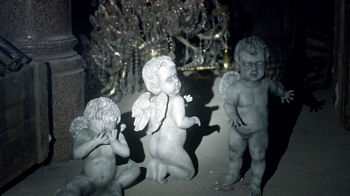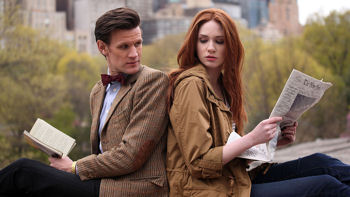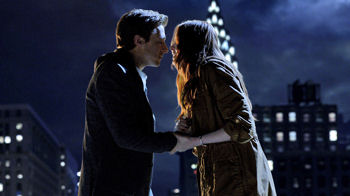|
Doctor
Who
The Angels Take Manhattan
One of the more interesting answers to the question "Doctor Who?" that I've read goes all the way back to the 1968 story "The Mind Robber." The theory (which I first read on TARDIS Eruditorum, and you should read it there too—go on, I'll wait here for you), as I understand it, states in a nutshell that the Doctor Who universe is fictional not just to us but also to the Doctor; that the Time Lords are the uninvolved overseers of the stories within it; and that the Doctor ran away from his home planet because he didn't want merely to observe these stories unfolding, but to become involved and help create them. I favor the less postmodern viewpoint that the Doctor is a clever alien, a lot like us but biologically and technologically gifted, and that River Song's description of him as an "ageless god who insists on the face of a 12-year-old" is a colorful exaggeration. But it's hard to deny that the new series in particular (see especially "The Big Bang") seems to favor this interpretation at least implicitly: the Doctor is at least as much a god as the author of any story, and that stories and ideas and memory can create and reshape reality.  It's not that much of a stretch when you think about it. The difference between fiction and history is no more than the difference between imagination and real life. Time travel in a book is as simple as flipping back a few pages. And in "The Angels Take Manhattan," we have a book in which what is apparently fiction becomes reality through the simple method of seeing it on a page or reading it aloud. The Angels can only trap you when you don't look; Melody Malone's novel can only trap you when you do. It's not that much of a stretch when you think about it. The difference between fiction and history is no more than the difference between imagination and real life. Time travel in a book is as simple as flipping back a few pages. And in "The Angels Take Manhattan," we have a book in which what is apparently fiction becomes reality through the simple method of seeing it on a page or reading it aloud. The Angels can only trap you when you don't look; Melody Malone's novel can only trap you when you do.
In some cases it seems as though the trap results from jumping to conclusions: for example, one of the passages Amy reads to the Doctor doesn't actually say "Melody broke her arm," it just says that she asks "Why do you have to break mine?"
As always, the episode left me full of questions, perhaps inevitable in a situation as timey-wimey as this. The biggest one for me was just making sense of when the Angels and Winter Quay existed. If they kept sending people back in time, wouldn't they eventually hit an era when the building wasn't there? Or if they kept yo-yoing people from 1938 to, say, 1908 and letting them age, what did their victims eat for the 30 intervening years?
The Angels are a fabulous horror-fantasy concept, but they're harder to read as science fiction, and just one more reason this show (now more than ever) really doesn't qualify for that label. Instead, this is Sandman in space, which is not a terrible thing at all.
Speaking of space, every single setting for this story looks fabulous. I'm biased here, because I love noir as much as I don't love westerns (probably one reason I didn't cotton to "A Town Called Mercy"), and even though this didn't quite feel noirish to me—it needed a steadier camera, for a start—it at least felt sumptuous and atmospheric. I love watching the TARDIS crew skulk around darkened hotels or foreboding mansions. The only visual element that didn't really work for me involved the Statue of Liberty, but even there I have to applaud the ambition.
 The other theme "The Angels Take Manhattan" keeps bringing up is age. It starts innocently enough, with the Doctor noticing and then trying not to notice that Amy (presumably not much over 30, and of course Karen Gillan isn't even 25) is getting crows' feet. The other theme "The Angels Take Manhattan" keeps bringing up is age. It starts innocently enough, with the Doctor noticing and then trying not to notice that Amy (presumably not much over 30, and of course Karen Gillan isn't even 25) is getting crows' feet.
He seems oddly squeamish about it, given that he's married (and evidently attracted) to a woman who looks middle-aged and has never, in past incarnations, seemed all that concerned with age before.
But we've already seen this Doctor deal with nightmarish old people in "Amy's Choice," and shut an older Amy out of the TARDIS in "The Girl Who Waited." More than that, we haven't seen him travel (on TV, anyway) with any regular companions who appeared to be past their twenties since 1966, with the possible exceptions of Grace, Donna, and the second Romana. It's easy to forget, especially when the Doctor is played by a younger actor, that his companions really are typically very young.
So it doesn't seem entirely strange for River to be concerned about her place in her husband's life, and to distance herself from the possibility of travelling with him full-time. I don't quite follow whether they're still meeting in reverse order or if they sometimes go forward now or what, but it seems clear they'll never have a stretch where they're together long-term.
Which brings us to the ending of this episode, and if you didn't heed the spoiler warning before, you'd better heed it now. If you haven't seen this episode yet, don't read any further until you have. You may have known ahead of time that this was finally to be Amy and Rory's last episode, and you may have been wondering what would finally break up this seemingly inseparable trio if not death. Several episodes this season have already foreshadowed the death of the Ponds—or, as we're led to think of them by story's end, the Williamses. But we also know that Moffat is rarely if ever that obvious.
 So rather than kill them off straightforwardly (as we're teased once more to think he might, after their rooftop resolution), Moffat sends them back in time to live out a full life in 20th century Manhattan. According to the Doctor and River, the TARDIS can't ever visit them again due to all the timey-wimey paradox action required to dispatch the Angels (save one, and do they kill that one too? if so, how? if not, what's to stop it preying on Manhattan in 2012?). So rather than kill them off straightforwardly (as we're teased once more to think he might, after their rooftop resolution), Moffat sends them back in time to live out a full life in 20th century Manhattan. According to the Doctor and River, the TARDIS can't ever visit them again due to all the timey-wimey paradox action required to dispatch the Angels (save one, and do they kill that one too? if so, how? if not, what's to stop it preying on Manhattan in 2012?).
I'm still fuzzy on whether the TARDIS is excluded from the city limits of Manhattan in every time period or just 1938, or why the Ponds couldn't just leave Manhattan and visit the Doctor in Poughkeepsie or Boston in 1947. Couldn't they just use Vortex Manipulators again to "motorcycle through traffic?" Perhaps we just have to accept that it's been written—by River in the Melody Malone book, or by Moffat, take your pick—and that's all the explanation we're going to get.
When the Doctor declares "I hate endings," it sounds like he's speaking for every Doctor Who writer since 2005, except maybe Tom MacRae. There are many things the new series does more maturely than the classic series, but goodbyes are not among them. It used to be that companions would say goodbye to the Doctor like grownups, sometimes to stay and help the people they'd been saving, sometimes for less-than-convincing reasons like whirlwind marriages to characters they'd barely spoken to.
But as a grownup who can't seem to say goodbye to the Doctor myself, I should probably have more sympathy for companions who won't leave until they're forced to, like Rose (trapped in another dimension) and Donna (compelled to forget). To be fair to Amy, she did have several chances to say goodbye to the Doctor ("The God Complex," every other story this season) and it seems clear that, more often than not, he's the one who kept coming back to her. He even does it one more time at the very end, at her posthumous request, in a pretty wonderful coda.
"The Angels Take Manhattan," then: not a perfect goodbye, and perhaps only truly heartbreaking if you'd managed not to know it was coming, but satisfying, even beautiful if you look at it through the right glasses. One story—two and a half seasons of the girl who waited and the boy who waited for her—ends. And at Christmas, another begins.
|

 It's not that much of a stretch when you think about it. The difference between fiction and history is no more than the difference between imagination and real life. Time travel in a book is as simple as flipping back a few pages. And in "The Angels Take Manhattan," we have a book in which what is apparently fiction becomes reality through the simple method of seeing it on a page or reading it aloud. The Angels can only trap you when you don't look; Melody Malone's novel can only trap you when you do.
It's not that much of a stretch when you think about it. The difference between fiction and history is no more than the difference between imagination and real life. Time travel in a book is as simple as flipping back a few pages. And in "The Angels Take Manhattan," we have a book in which what is apparently fiction becomes reality through the simple method of seeing it on a page or reading it aloud. The Angels can only trap you when you don't look; Melody Malone's novel can only trap you when you do.  The other theme "The Angels Take Manhattan" keeps bringing up is age. It starts innocently enough, with the Doctor noticing and then trying not to notice that Amy (presumably not much over 30, and of course Karen Gillan isn't even 25) is getting crows' feet.
The other theme "The Angels Take Manhattan" keeps bringing up is age. It starts innocently enough, with the Doctor noticing and then trying not to notice that Amy (presumably not much over 30, and of course Karen Gillan isn't even 25) is getting crows' feet.
 So rather than kill them off straightforwardly (as we're teased once more to think he might, after their rooftop resolution), Moffat sends them back in time to live out a full life in 20th century Manhattan. According to the Doctor and River, the TARDIS can't ever visit them again due to all the timey-wimey paradox action required to dispatch the Angels (save one, and do they kill that one too? if so, how? if not, what's to stop it preying on Manhattan in 2012?).
So rather than kill them off straightforwardly (as we're teased once more to think he might, after their rooftop resolution), Moffat sends them back in time to live out a full life in 20th century Manhattan. According to the Doctor and River, the TARDIS can't ever visit them again due to all the timey-wimey paradox action required to dispatch the Angels (save one, and do they kill that one too? if so, how? if not, what's to stop it preying on Manhattan in 2012?).





